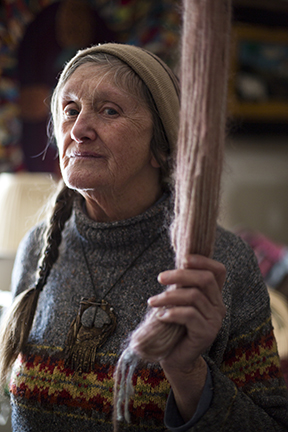Maine Seniors are Going Hungry
Guest post by Olivia Dooley, Senior Hunger AmeriCorps VISTA
Throughout the month of May, Good Shepherd Food Bank has shared some startling statistics about senior hunger. In case you missed it:
- The number of seniors in our state that experience food insecurity has doubled in less than 5 years
- Almost 1 in 3 Maine seniors face hunger or the threat of hunger
- Maine has the 12th highest senior food insecurity rate in the U.S.
- Almost 2 out of 3 Good Shepherd Food Bank senior clients report having to choose between spending money on food or paying for other essentials such as medicine and heat

Behind these numbers are people like Donna—hardy Mainers that have worked hard and find themselves struggling to make ends meet in their older age. Like Donna, 1 out of 2 Maine seniors don’t have enough money to cover their basic needs. To help ease their burden, seniors can tap into various nutrition policies and programs.
Federal Programs that Serve Hungry Seniors
Our country has several federal policies that aim to reduce senior food insecurity and play a crucial role in the fight, such as:
Meals on Wheels
Provides homebound seniors with meals and a visit. Meals on Wheels is part of the Older Americans Act and is administered by the State Unit on Aging, known as the Office of Elder Services in Maine.
Congregate Meals
Provides seniors with a community meal at sites such as senior and community centers. This program is also part of the Older Americans Act and is administered by the Office of Elder Services.
Senior Boxes
Officially known as the Commodity Supplemental Food Program (CSFP), this program provides eligible seniors with a box of food every month and is administered by the Maine Department of Agriculture, Conservation and Forestry.
Senior FarmShare
Provides eligible seniors with a share of produce from a local farmer for 8 weeks in the summer. The Maine Department of Agriculture coordinates this program.
Child and Adult Care Food Program
CACFP helps Adult Day Care Centers provide meals for eligible senior clients. The Office of Child and Family Services, part of Maine’s Department of Health and Human Services, oversees this program.
Supplemental Nutrition Assistance Program
SNAP provides eligible people, including seniors, with monthly benefits to purchase food at qualifying locations. The Office of Family Independence, also part of DHHS, administers SNAP in Maine.
The Emergency Food Assistance Program
Provides low-income individuals, including seniors, with food through emergency food providers such as pantries. TEFAP is administered through Maine’s Department of Agriculture.
A Large Unmet Need
While these federal programs are instrumental in serving seniors, most of them are not intended to meet the full nutrition requirements of seniors, but rather aim to relieve the severity of the problem. Additionally, with the exception of SNAP, these programs are already serving the maximum number of people that funding allows.
This leaves a significant portion of the senior population without access to resources. Forty-five thousand Maine seniors experience food insecurity and another 56,000 face the threat of hunger. Meals on Wheels, for example, is able to serve about 4,300 people in Maine with current funding. This leaves over 90 percent of food insecure seniors unserved.
Critics often say it’s too expensive to serve everyone, but it’s not a matter of cost, it’s a matter of priorities. Meals on Wheels America says that they could provide meals for seniors for one year for roughly the same cost as just one day in the hospital. Our communities therefore have a financial incentive, not to mention moral imperative, to keep seniors healthy by supporting senior food security efforts.
Good Shepherd Food Bank’s network of over 400 community partners plays a vital role in serving hungry seniors throughout the state, but we still have more work to do. Maine is a rapidly aging state. We are currently the oldest state in the U.S.; we have the highest percentage of Baby Boomers in the nation; and every day, 50 Mainers turn age 65. As a state, we’re facing an intensifying challenge to care for the elderly and address senior hunger. However, we are also a state with strong communities and a network of passionate people and organizations whose mission is to serve older Mainers. We can fight senior hunger by working together, ensuring that seniors know about existing support services and championing the expansion of these services.
You can help serve our aging population and combat senior hunger by:
- Connecting your community with your local Area Agency on Aging
- Getting involved in AARP’s Aging in Place network
- Fighting senior hunger by donating to Good Shepherd Food Bank